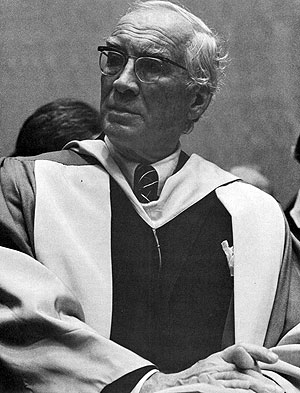Manitoba History, Number 2, 1981
|
It is indeed right, meet and proper that we are assembled here today in the Chapel of St. John’s College, in prayer, to give our thanksgivings for the life of Dr. W. L. Morton. His contribution to the fabric of Canadian society is almost indefinable by virtue of its magnitude. Among the multitudinous perpetual living memories to his life, is the existence of this college on the campus of this University. Without his unobtrusive efforts and his steadfast dedication, it is indeed questionable whether this college would be here today on this location.

W. L. Morton
No Canadian scholar, since H. A. Innis, has so profoundly influenced the vision of scholarly pursuits in the field of liberal knowledge. To say that W. L. Morton was a Canadian historian does not do justice to his contribution. His coherent view of life gave history a new transformation. For all subsequent scholars in the field it provided depth and breadth. His transforming insights were founded on tireless and systematic research. To regurgitate and re-articulate what others had said, he found sterile. His heritage was of pioneer stock and his contribution to Canada was a blazing of new trails through virgin forests. With his ruling passion for truth, he was merciless to error, and always held this concept as a cardinal precept in his endeavours.
The soul of W. L. Morton was a soul abounding in the Christian faith, of the Anglican Church, which has such deep roots in historical and ecclesiastical truths.
My forty years friendship with him exposed me to many facets of his life—academic, university, community, politics and business. I was enormously enriched by these experiences. He was never compromised by the expediency of the immediate—what was right always governed his decisions, with the solace of knowing that truth ultimately would be the conqueror. We of this University were more than fortunate to have had him as a colleague and friend. Likewise, the full academic community of our nation and borders beyond have shared in this good fortune. Sham and hypocrisy melted away by his very presence. His penetrating intellect was a beacon light for all to follow. His career symbolized the ultimate example of scholarship. His good humour, interest and concern gave a fillip to many.
It was not for glory, honour or riches that he lived, but to be God’s servant to encourage free men to seek the truth. Vision, wisdom, intellectual power and integrity were his hallmark.
With the fall of a great oak
That crashes down upon the hillside
And leaves a lonely spot against the sky
A great loss occurs.
Likewise here. Research that was underway will now not be completed. The life of this great scholar was not spent, but he has fallen like a great oak, and leaves a barren horizon.
However, this is an occasion to give thanks and praise to God for his great gift through the life of W. L. Morton. Those who were fortunate enough to be associated with him have been indelibly influenced by that experience, and all that he meant will be carried on through them. Those still unborn will have their minds moulded by his penetrating scholarship through published works.
He by far is the most distinguished Honourary Fellow of this College. By comparison I am a most unworthy Honourary Fellow of St. John’s College, but I say on behalf of all of us:
His spirit and influence is indestructible. May we seek to be worthy of his labours for the things he championed as being important. William Lewis Morton is not dead, for his work continueth greatly beyond his knowing.
Page revised: 23 April 2010